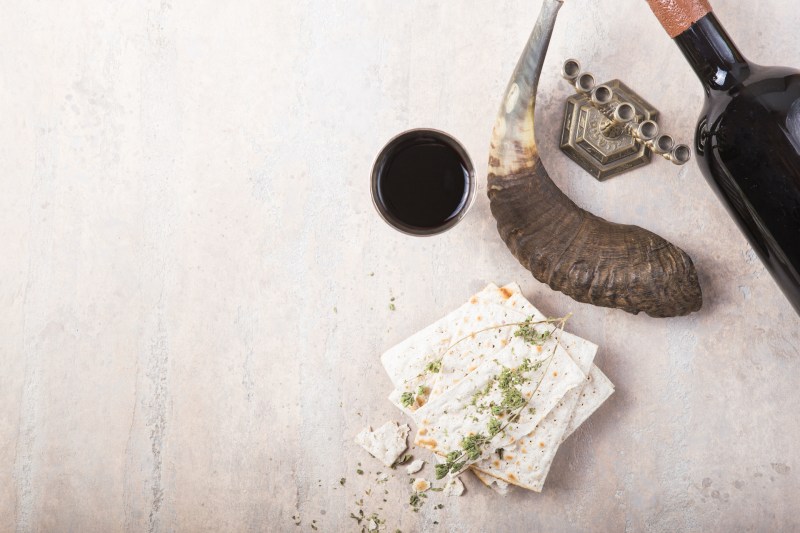
Living in the current wonderfully rich and diverse world of wine, it’s hard to imagine when kosher wine was hard to come by and consisted mainly of Manischewitz – a syrupy, often cloyingly sweet wine made from American Concord grapes. We raise our glasses with you for those who love Manischewitz for its rich history, traditional significance, or nostalgic draw, for there is nothing more important than traditions that hold special meaning in our lives. But for the observant among us who are craving something a bit more complex or sophisticated in their glass, kosher wine options have opened up significantly in recent years. Winemakers all around the world are now creating certified kosher wines from an immense variety of grapes and in a wide range of styles, including sweet, semi-sweet, dry, and sparkling.
While observant Jews have certain food restrictions, including shellfish and pork, and during Passover, yeast-leavened bread, certified kosher wine doesn’t restrict the options and styles of wines available. Kosher wines classified as mevushal (cooked) wines have an extra step during production that – to some drinkers – lowers the quality of the wine. Thankfully, though, technology has helped to greatly improve the current available options.
Royal Wine Corp. is the largest manufacturer, importer, and exporter of Kosher wines and spirits, with a portfolio that spans hundreds of brands and thousands of bottles of world-class wines. For this year’s Passover, they are introducing top-quality wines from some of the finest wine-producing regions, including California, France, Italy, Spain, and Israel.
So, if you’ve been tasked with bringing wine for Seder dinner or are just looking for a beautiful bottle that happens to be kosher, consider the following wines. Be sure to buy plenty, as tradition dictates each guest drinks four full glasses at Passover.
Our recommendations

According to Jay Buchsbaum, VP of Wine Education at Royal Wine Corp., “There’s nothing cookie-cutter about these Passover wines – they are top-notch, award-winning and distinctive. And, while red wine is traditional for the Passover Seder, it can be a nice Burgundy, a Pinot Noir, or a Cabernet – just as long as it is kosher for Passover. There are dozens to choose from. And, to be clear, our portfolio consists of acclaimed wines that just happen to be kosher, recognized for our quality and value.”
Rocca delle Macie Chianti Classico
This renowned and world-famous winery is now producing kosher wine for the first time exclusively for Royal Wine Corp., with even more on the way.
Lovatelli
This new line of fine and affordable Italian wines includes gems such as Salento Primitivo and a delicious Barbera d’Asti. Wines that are rumored to be coming soon include Nebbiolo, a Super Tuscan, as well as two new vermouths.
Cantina Giuliano
This fully kosher boutique winery started in Tuscany in 2014. Started by a young couple who inherited wineries from their grandparents, this family business is now fully kosher with new bottles and labeling.
Why four cups of wine?
According to Royal Wine Corp., one of the rituals served at Passover is the custom of drinking four cups of wine. The four cups of wine are consumed in a specific order as the story of Exodus is told. Served to the adults throughout the dinner, these four wines represent points from the exodus story. While several explanations exist for the significance of the number four, the connection to “freedom from exile” is often referenced. For observant Jews, the wine served should be kosher. Although kosher wine uses the same grapes as other wines, the wine-making is handled by “sabbath-observant Jews.”
Is kosher for Passover wine hard to find?
Royal Wine Corp. told The Manual, “Actually, it’s rather easy! Most kosher wine is also kosher for Passover, making it easier to sell this wine (and for consumers to stock up on bottles) year-round. Any kosher-for-Passover wine will have a “P” symbol or “Kosher for Passover” next to the kosher certification on the label.
Fine kosher wines are made the same way that fine non-kosher wines are made. There is no kosher winemaking ‘technique.’ What’s required for the wine to be considered kosher is that the wine be handled only by Sabbath-observant Jews. And there are plenty of fine winemakers and cellar workers who are Sabbath observant. Great grapes and skilled winemakers yield great wines—kosher or not.
Consumers looking for wines from renowned regions worldwide can satisfy their thirst with more options than ever before. It seems the problem is not the availability of great wine but the overwhelming number of great wines to choose from. Royal Wine Corp. offers a delicious selection of kosher for Passover wines from around the world.”





